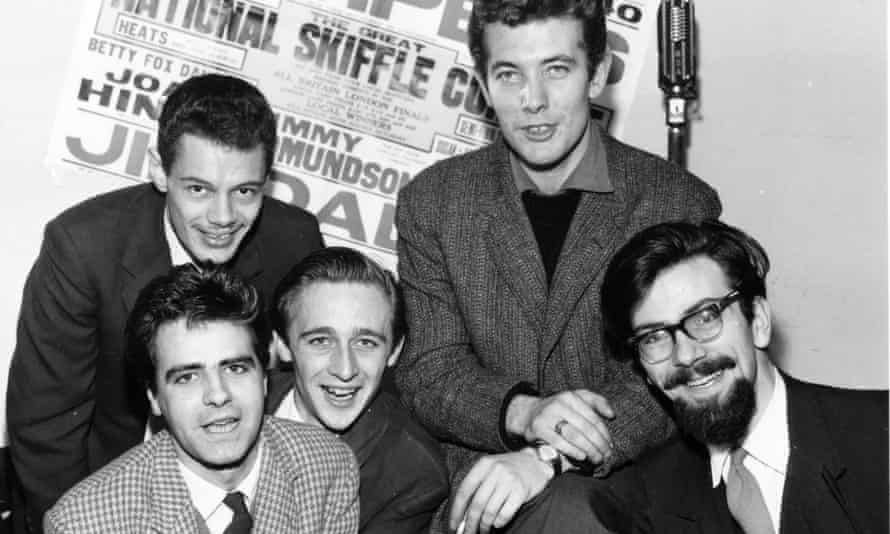By Dave Arthur
Last modified on Thu 4 Feb 2021 20.55 GMT

John Pilgrim, who has died aged 87, achieved fame, if not fortune, as the washboard player with the Vipers during the brief mid-50s skiffle craze. The Vipers were among the most popular and exciting of British skiffle groups, and, as the first resident band at the 2i’s coffee bar in Soho, London, helped set the ball rolling for British rock’n’roll, with many early stars emerging from the 2i’s cellar. They toured widely and had chart success, notably with Don’t You Rock Me Daddy-O, released on Parlophone in 1957, which reached No 10, and then with Cumberland Gap and Streamline Train.
Skiffle had emerged from the postwar British New Orleans revival jazz bands – simple, catchy music popular with British teenagers, who discovered they could play this “folk music with a beat” on homemade instruments and using only three or four guitar chords. Within months of the runaway success of Lonnie Donegan’s Rock Island Line in 1956, there were thousands of skiffle groups across Britain – it was the first really demotic teenage music.
But soon it had run its course, and most skifflers went back to their old jobs. The Vipers folded in 1960 after several changes of personnel, faced with falling interest and falling revenue from the public and record companies. Pilgrim went on to work as a bookseller, journalist, teacher, radio DJ, record distributor, and a faithful, conscientious and perceptive chronicler of his Soho generation. His writing was enhanced by his encyclopedic knowledge of jazz and blues, and he had strong opinions that he was happy to air in a bar, or in print.
He was a lifelong friend of the guitarist Davey Graham, and one of Pilgrim’s greatest satisfactions was After Hours, the acclaimed Graham album he produced in 1997, considered by many to be the guitarist’s finest. It had been recorded on a domestic tape recorder in Pilgrim’s mature students’ quarters at Hull University in 1967, and captured a relaxed Graham at the height of his powers.
Born in central London into a working-class family during the “hungry 30s”, John was one of three children of Henry Pilgrim, a clerk in the paper industry, and his wife, Jessie (nee Walter). The family moved to Castelnau council estate, in Barnes, south-west London, and John won a scholarship to East Sheen grammar school.
But by then he had discovered jazz. In a box of records at school he unearthed Charlie Barnet’s Skyliner and Muggsy Spanier’s At the Jazz Band Ball, which were a revelation. He began a jazz quest, not easy in 1946. BBC jazz programmes were rare and when his favourite was taken off air each summer to make way for cricket, it instilled in him a lifelong hatred of the sport.
He dropped out of school as soon as possible, got a messenger job at the Guardian, and began to haunt Soho, where he discovered Dobell’s bookshop in Charing Cross Road, which had started to stock jazz and blues records. He got to know many of the luminaries of the nascent jazz club scene, including Chris Barber, who played at Pilgrim’s “joining the army” party. Humphrey Lyttelton had told Pilgrim the army was a good place to learn instruments and play in a band, so Pilgrim signed up for a few years in his late teens as a bandsman, his instrument the clarinet.
He also learned to play the washboard, and in the 1950s, with Russell Quaye and his flatmate, the journalist Harold Jackson, Pilgrim started what became the City Ramblers. He was playing the washboard for fun, too, with his friends Wally Whyton and Johnny Booker and Jean van den Bosch, all on guitar and vocals, at the Breadbasket coffee house in Cleveland Street, and they formed the Vipers in 1956. Later they were joined by Tony Tolhurst on bass.
Pilgrim often performed with his pet monkey, Iggins, sitting on his shoulder, who at other times lived in the kitchen of his flat in Pearman Street. On one occasion, Iggins defecated on Donegan, something Whyton said a lot of people had been wanting to do for a long time.
In 1957 Pilgrim married Tena McLaren, and in the post-skiffle years they ran an alternative bookstall in Charing Cross Road. One of their customers, the historian Eric Hobsbawm, encouraged Pilgrim to return to education. Around 1966 he embarked on a degree in sociology and politics at Hull University, where he played in a college jugband called Humberjug, and hung out in the bar discussing jazz with the poet Philip Larkin, who was the university librarian and a fellow jazz enthusiast.
Pilgrim took a master’s in sociology of science at Manchester University, and then taught in Liverpool. In the late 1970s he moved to West Yorkshire, where he ran Jazz Services, a record distribution company, in Sowerby Bridge, and also went on the road with Sonny Terry and Brownie McGhee for three of their British tours. Terry declared him the “best washboard player in the country”. He played with the Hot Vultures several times, including at the Cambridge folk festival in 1974, and on their album Carrion On in 1975.
His business eventually folded and he moved to Woodbridge in Suffolk, where he got back into writing, contributing regularly to the Independent and the Guardian. Throughout the 90s he made a monthly appearance on Stephen Foster’s Blues Show on Radio Suffolk – these ventures, plus his small teacher’s pension, were enough to keep him going.
His marriage ended in divorce in 1986, and for the past 20 years Pilgrim lived in Yoxford, Suffolk, with his partner, Deborah Ardizzone. He is survived by Deborah, and by his daughter, Kerry, from his marriage, two grandchildren, Asha and Lauren, a great-grandson, Joseph, and his sister, Anne.
• John Pilgrim, skiffle musician and writer, born 7 April 1933; died 18 December 2020
